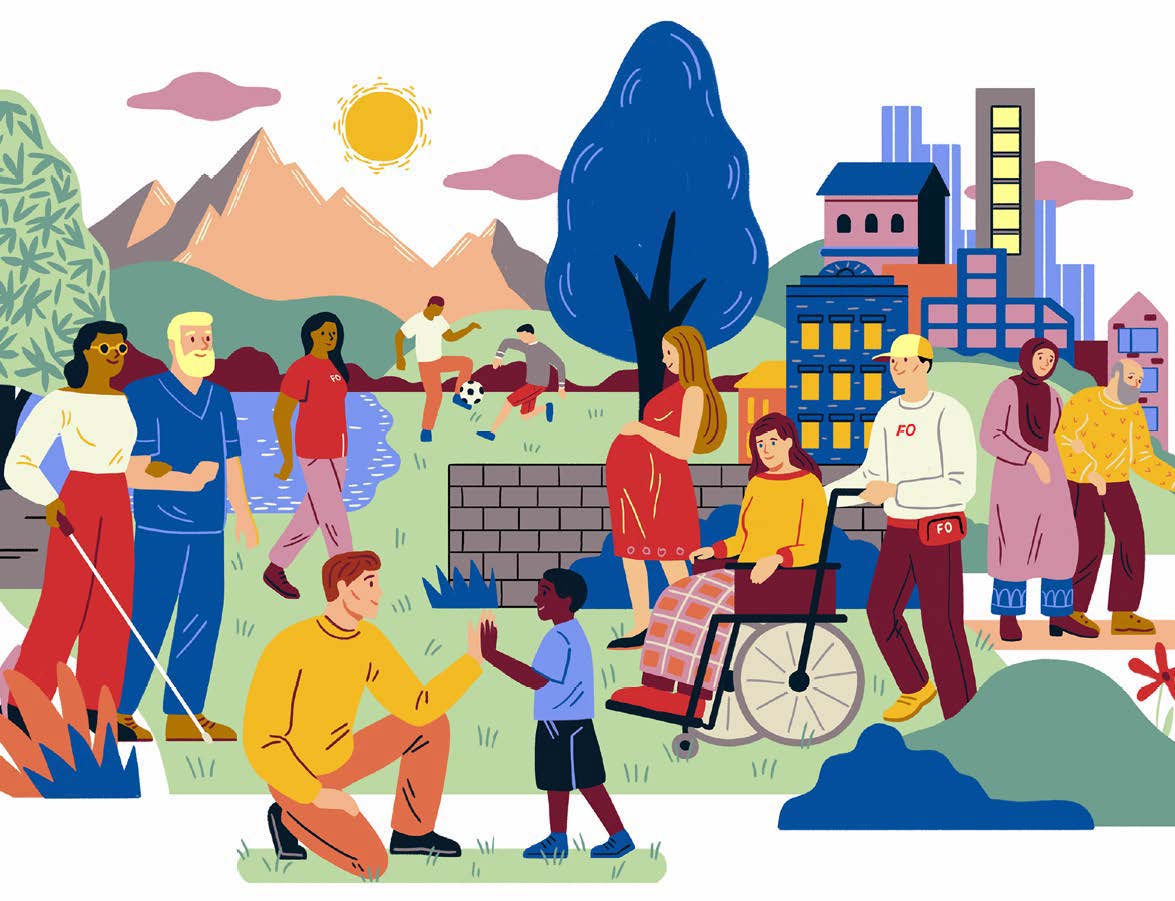Encounters Between People
Health and social work is practiced in encounters between people. The professional must be consciously aware of their own behaviour, motives, and values, and how they influence those they meet. As professionals, we must be attentive to how we, as professional parties, affect the power dynamics in the relationship, and that professional power can be used in different ways.
Professional Judgment and Assessments
Generalized knowledge, legal rules, and values and norms are not a sufficient basis for action in the face of individuals’ diverse and often complex needs. Health and social work presuppose that professionals act professionally and exercise good professional judgment.
Good professional judgment involves assessing various courses of action and making choices even when no solutions appear ideal.
The professional must be aware that both the person receiving help and the professionals’ experiences and cultural background influence how a situation is perceived, experienced, and assessed. Good professional judgment must be based on the best possible exploration of the current situation and the perspectives of those affected.
Professionals are responsible for discussing ethical dilemmas and seeking guidance when in doubt.
Dialogue and Collaboration
Collaboration is a prerequisite for the practice of health and social work. A holistic and well-coordinated service relies on good relationships between those involved. To collaborate towards common goals, professionals must be familiar with and show respect for others’ expertise, roles, and work situations. We must engage in meaningful dialogues with individuals in need of assistance and relevant collaborators.
Dialogue involves sharing personal perspectives on a situation or problem with other involved parties[AT1] , trying to see the world through the eyes of the other. The aim is to reach a joint decision on the way forward that upholds the values of those involved and is accepted by all.
Health and social work is often characterized by contradictions. Acknowledging conflicts is a prerequisite for doing good work. Criticism of colleagues should be openly addressed with the concerned party before taking the criticism further in the system. Loyalty to colleagues must not hinder an open discussion about treatment methods or discretionary assessments in specific cases.
Digital Tools and Communication
Although the work of health and social workers primarily occurs through meetings between people, digital services and communication are essential. Digitization contributes to improved and more efficient services. Everyone must have the opportunity to use such services. This requires professionals to take responsibility for providing sufficient and tailored information and guiding individuals as needed.
Digital communication may provide fewer opportunities to clarify potential misunderstandings or questions. Therefore, professionals must have good competence in using digital tools to communicate clearly and understandably. It should be adapted in such a way that everyone could communicate digitally. Different backgrounds and prerequisites must be considered.
Confidentiality and Privacy
Privacy is a fundamental value in health and social work. Confidentiality is strictly regulated by law and is intended to protect the individual’s right to control information about themselves. It is a prerequisite for a trusting relationship.
Confidential information can be disclosed with consent. If consent is not obtained, the individual must be informed before disclosing confidential information to others, except in cases covered by reporting and intervention obligations. Legal regulations and ethical considerations dictate that there must be compelling reasons to breach confidentiality. Professionals must ensure that consent is given with sufficient information, and the consenting party understands the implications. Professionals must tailor information to the person’s age and abilities.
Even with consent to breach confidentiality, privacy should be preserved as much as possible. Professionals must critically assess how much information needs to be shared, how many people need it, and in what form it should be shared. In the acquisition of sensitive information, moderation is crucial, and only necessary information should be requested to address the specific case.
New and extensive information channels and social media provide immediate and effective communication. This demands caution in information dissemination about third parties. Professionals in child welfare education, social work, care work, and welfare administration must be conscious of their roles. It is crucial to reflect on whom to represent when appearing in social media, where it can be hard to distinguish between the roles of a private individual, professional, and representative.
Loyalty
Professionals, in their societal responsibility, have various interests to uphold. They are responsible for meeting individual needs for help and support. Concomitantly, we are stewarding the society’s collective resources in the best interest of all. Loyalty is expected toward political directives and decisions, especially concerning organizational and economic regulations.
This balance places professionals in a dilemma, and conflicts of loyalty may arise. Prioritizing between different needs and individuals becomes necessary. The primary loyalty is with the most vulnerable party.
Professionals must distinguish between rights and needs. Rights indicate what an individual is entitled to, while needs are always a matter of judgement. Economic constraints and limited resources require prioritizing. Loyalty conflicts may, overtly or implicitly, lead to choices that contradict professional ethical values. Professionals must be conscious of such dilemmas and able to address and discuss them with involved parties.
Power and Exercise of Authority
Health and social work involve the exercise of power and authority. Professionals should use their power to help individuals highlight their resources and needs. The resources of the individual are to be mobilized to allow maximum influence and responsibility over the individual’s life. Professionals must seek and acknowledge the person’s understanding of their situation and provide clear information about rights, opportunities, and available services. Written material should be designed for easy comprehension.
Many may experience having little real influence when dealing with the public support systems. The professional practitioner acknowledges that the individual knows their own life history and situation best. As professional practitioners, we must be aware of the asymmetry in the relationship and that the methods we use may be perceived as exerting power. The professional practitioner must also be conscious that their own powerlessness, insecurity, or negative attitudes towards a person can increase the risk of abuse of power.
Exercising power and authority can be particularly challenging when working with people who struggle to understand and interpret situations or express their desires and needs. In such encounters, it is essential to gather necessary information from others who are familiar with this person and to be attentive to body language and other expressions that convey experiences and dissatisfaction.
Use of Coercion
The use of coercion and force is always ethically problematic, even when deemed necessary and justifiable. Subjecting an individual to coercion will invariably impact the person’s integrity.
The professional practitioner should approach all use of coercion with a critical perspective and take responsibility for discussing issues related to its use. We must actively seek alternatives to coercion and be advocates in professional efforts to combat and prevent unnecessary coercion. The individual themselves may identify other and multiple alternatives to coercion, and professional practitioners must contribute to dialogue and assistance before the situation becomes so serious that coercion appears to be the only solution.
Coercion can encompass everything from deprivation of liberty, the use of coercive measures, forced treatment, and other physical exertion of force to limitations on self-determination and choices. A good understanding of the legal conditions for the use of coercion is a prerequisite for professionally sound use of coercion, but legal regulations do not eliminate ethical dilemmas and burdens associated with coercion.
Clear information and dialogue about the justification for using coercion can make the measures more understandable and help reduce negative experiences and consequences. This can be further strengthened if it is necessary to use coercion against someone who does not have the prerequisites to understand why.
Professional practitioners may find themselves being instructed to carry out coercive measures that they are professionally or ethically opposed to but that others have assessed as justifiable and decided upon. In such situations, the professional practitioner must particularly assess various action alternatives and obligations.
Openness, Information, and Whistleblowing
Through their work, professionals become aware of situations that may lead to social problems, social exclusion, undignified living conditions or otherwise attracting public attention. Public employees have a duty to inform political decision-making bodies through official channels.
Professionals who identify errors, deficiencies, or unethical conduct within their organizations have the right to whistleblow, according to labour laws. There is also an ethical responsibility to blow the whistle in health and social work. In health and social work, this may include reporting on colleagues’ breaches of ethical values and obligations.
Whistleblowing procedures must be conducted responsibly and follow organizational protocols. In cases where official channels are ineffective, whistleblowing to public supervisory authorities may be necessary.
Whistleblowing can be stressful for the whistleblower. In certain situations, the whistleblower should not stand alone in reporting critical issues. Colleagues or the labour union can provide essential support in such situations.
Fair Green Transition
Environmental challenges such as climate change affect the entire world, with the most vulnerable individuals being the hardest hit. The ongoing crisis requires a collective shift towards a more sustainable way of living. The green transition involves adopting sustainable solutions in areas such as procurement, consumption, energy sources, travel, tax and distribution policies, and our relationship with the surrounding environment.
While health and social workers contribute to the green shift in their professional practice, they must ensure that green measures are perceived as fair by users, patients, and citizens. Professionals must work towards making green initiatives accessible to people with limited economic resources. Sustainable solutions should be chosen to ensure fair resource allocation, both among individuals today and for future generations.

